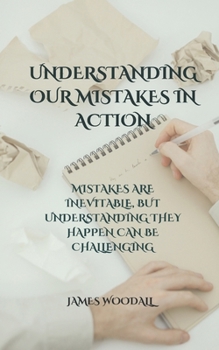Understanding Our Mistakes in Action: Mistakes Are Inevitable, But Understanding They Happen Can Be Challenging
Incorrect actions may arise for various reasons, often including emotional, cognitive and environmental influences. Ignorance is a significant contributor; without proper information or knowledge about a situation it increases our likelihood of taking inappropriate actions. Misjudging information, misinterpreting details incorrectly or neglecting key details are other contributing factors which lead to mistakes.
Cognitive biases play an equally crucial role. Overconfidence may cause us to underestimate the challenges we are up against, while confirmation bias could cause us to focus solely on facts that support our existing beliefs while disregarding evidence that contradicts them. Anchoring biases could force us to rely too heavily on first impressions or experiences and distort our decisions as a result.
External pressures like time constraints can force us into making hasty decisions without due consideration of all relevant factors, similar to social pressure which may cause us to take actions which don't align with our ideal goals or values.
Distractions--whether external (noise, interruptions) or internal (wandering thoughts)--can rob our attention of its focus and increase the risk of error. Routine behaviors or automatic responses without further analysis could also result in mistakes when faced with situations which require more examination.
Limitations in perspective can lead to errors. Failing to consider all relevant objectives and outcomes or favoring short-term gains over long-term impacts can cause poor decision-making, while over thinking or complicating situations could result in unnecessary confusion, second guessing or confusion resulting in lack of focus and mistakes caused by confusion.
Communication problems are another key source of error, including inconsistencies, unclear instructions and assumptions that haven't been confirmed or clarified resulting in errors due to our inaction in asking about or verifying these assumptions.
Unexpected events from outside can wreak havoc with plans. From sudden issues, technical malfunctions, to changes to our surroundings - unexpected events can wreak havoc with plans. Our ability to adapt quickly may be undermined when faced with unpredicted scenarios that arise unexpectedly.
Mistakes are an integral part of human behavior, often stemming from emotional or cognitive reactions, external influences or contextual considerations. While mistakes cannot always be eliminated completely, self-awareness, critical thinking skills and learning from past errors may help mitigate risk for making similar errors again in future
Cognitive biases play an equally crucial role. Overconfidence may cause us to underestimate the challenges we are up against, while confirmation bias could cause us to focus solely on facts that support our existing beliefs while disregarding evidence that contradicts them. Anchoring biases could force us to rely too heavily on first impressions or experiences and distort our decisions as a result.
External pressures like time constraints can force us into making hasty decisions without due consideration of all relevant factors, similar to social pressure which may cause us to take actions which don't align with our ideal goals or values.
Distractions--whether external (noise, interruptions) or internal (wandering thoughts)--can rob our attention of its focus and increase the risk of error. Routine behaviors or automatic responses without further analysis could also result in mistakes when faced with situations which require more examination.
Limitations in perspective can lead to errors. Failing to consider all relevant objectives and outcomes or favoring short-term gains over long-term impacts can cause poor decision-making, while over thinking or complicating situations could result in unnecessary confusion, second guessing or confusion resulting in lack of focus and mistakes caused by confusion.
Communication problems are another key source of error, including inconsistencies, unclear instructions and assumptions that haven't been confirmed or clarified resulting in errors due to our inaction in asking about or verifying these assumptions.
Unexpected events from outside can wreak havoc with plans. From sudden issues, technical malfunctions, to changes to our surroundings - unexpected events can wreak havoc with plans. Our ability to adapt quickly may be undermined when faced with unpredicted scenarios that arise unexpectedly.
Mistakes are an integral part of human behavior, often stemming from emotional or cognitive reactions, external influences or contextual considerations. While mistakes cannot always be eliminated completely, self-awareness, critical thinking skills and learning from past errors may help mitigate risk for making similar errors again in future
Format:Paperback
Language:English
ISBN:B0DPSP57HH
ISBN13:9798302690999
Release Date:December 2024
Publisher:Independently Published
Length:120 Pages
Weight:0.28 lbs.
Dimensions:0.3" x 5.0" x 8.0"
Customer Reviews
0 rating





